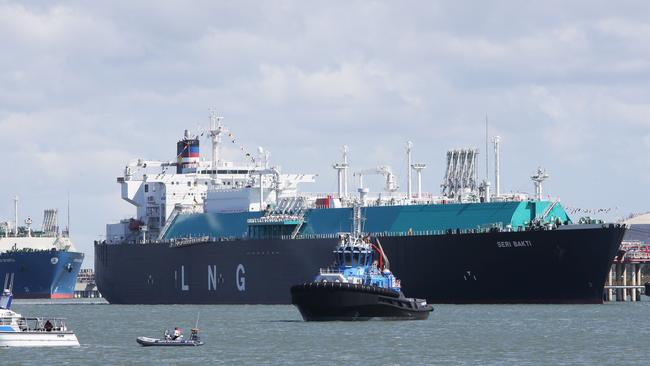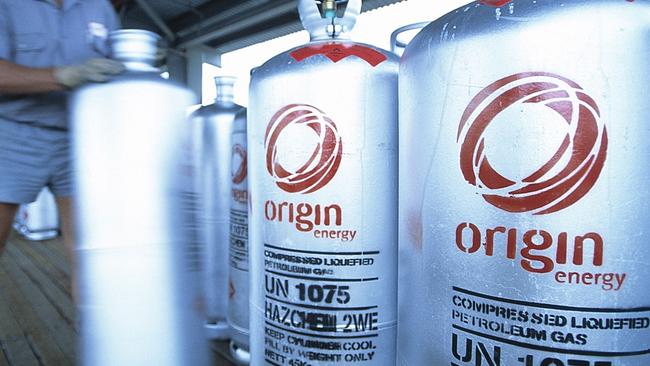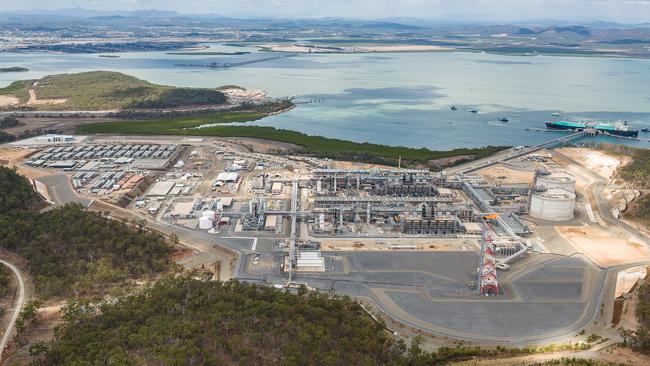Terry McCrann: Liquefied natural gas tax is all hot air
THERE is no pot of tax gold at the end of the liquefied natural gas rainbow, writes Terry McCrann.

Terry McCrann
Don't miss out on the headlines from Terry McCrann. Followed categories will be added to My News.
THERE is no pot of tax gold at the end of the liquefied natural gas rainbow. There quite simply aren’t billions of dollars of tax revenue going unclaimed because of a combination of tax office ineptitude and corporate malfeasance.
Yes, the government should certainly examine the tax arrangements of the LNG industry — technically, the actual extraction of the gas rather than its liquefaction for export to Asia.
It’s an industry that has expanded multi-fold in the last decade, while it still operates essentially under tax structures put in place at the back-end of the 1980s.
But the idea that either massive tax fraud is going to be uncovered or that the industry is making super-profits of which a bigger share should be claimed by Canberra is quite simply a fiscal dead-end. Not going to happen.
Further, the idea that this offers an ‘easy’ way to cut the Budget deficit — doesn’t mean hiking taxes on ordinary Australians, doesn’t mean hacking at spending; both politically very unattractive — has its own obvious dangers. Both in terms of how Canberra works (or doesn’t) and voter expectations.
It also very significantly risks diverting political focus from what should be the real tax issue: reforming the tax system and reducing the tax burden on both companies and individuals.
Now this latest burst of belief in a 21st century version of Norman Lindsay’s The Magic Pudding — a pot of gold that the more billions of tax you take out of it, the more it magically refills — was sparked by a report from the Australian National Audit Office.
Or perhaps more accurately, a report from the ANAO that was then hysterically blown out of all proportion and distorted into outright falsehood by the Greens and the Fairfax-ABC media combine.
The front page story in The Age on Tuesday said it all so predictably and completely falsely: that a “damning investigation” had “found” multinational companies were claiming billions of dollars in questionable deductions that was “dudding Australian taxpayers”.
First, it was not an ANAO “investigation” and, secondly, it found no such thing.
The ANAO was simply doing its ‘day job’. As its title might hint at, it does, well, audits — in this case, of the way the (Federal) Department of Industry, Science etc was doing its job of administrating the collection of North West Shelf royalty revenues.

It came to broadly three conclusions. First, that co-ordination between the Federal and WA state governments was, well, uncoordinated.
Second, that there were “significant shortcomings in the framework” for calculating NWS royalties.
And third, that there had been “limited scrutiny” of the claimed deductions for costs against profit before royalties were calculated.
None of that established, far less “damningly proved” massive tax leakage.
Especially, in the light of this sentence: “Some errors in the claiming of deductions have been identified, but the available evidence indicates that the problems are much greater than has yet been quantified.”
Why do I say that was significant? Because the ANAO specifically nominated a sum for royalties that had been identified so far as underpaid; and it was all of $8.6 million. To emphasise, that’s million not billion.
Yes, that might sound as lot of money to you, but it’s not even a rounding error in a Budget that is approaching $500 billion a year.
Yes, the ANAO, did note that “many matters’ had not yet been addressed. But logic would suggest that it there was a spare ‘billion or two or ten’ lying around, the ANAO might have ‘noted’ that in its audited process. Rather than just say: we’ve got back all of $8.6 million but … there is more!
So how did The Age get to its “Gas giants reap tax bonanza? Answer: that the ANAO had “discovered” a $5 billion bonanza of deductions.
In fact the ANAO had simply noted that more than $5 billion worth of deductions were claimed against petroleum revenues in the 18 months to December 2015. It made no suggestion they were excessive, far less improper.

Indeed, they were deductions for things like operating costs, the crude oil excise paid, depreciation and so on. Gee, you mean to say a business can deduct its operating costs before arriving at profit on which tax is calculated? What an outrage!
What The Age completely missed was that if the NWS project has been dudding the taxpayer on royalties, it must also have been dudding the taxpayer with normal company tax. They get paid after essentially the same deductions.
Yes, there can be an argument over specific items, as indeed there can be with you in your personal tax return, but to suggest massive tax fraud and a tax office that just meekly accepts the taxpayer claims, is to say the least, implausible.
The ANAO was conducting an audit of process. It was pointing out how it could — it should — be done better.
It was not conducting a forensic analysis of the tax returns.
Yes, there might be some tax scraps to be picked up, but there is no way billions are suddenly going to flow.
That should be obvious to anyway who has the slightest idea of what’s been happening in the industry.
On the one side, the way the companies have spent billions — actually, close enough to $200 billion on new developments and expansions; all of which is appropriately deductible over time from revenue before arriving at taxable profit.
While on the other side, gas prices, and so revenues and then profit, are a lot lower than was the case when the oil price was over $US100.
Further, it is important to understand just how much tax — and so external assessment — is applied.
There are the crude oil and condensate excises, state royalties, and for the NWS project both a federal royalty and a special Petroleum Resource Rent Tax and then finally normal company tax.
As the ANAO report noted, in the 18-month period (during which The Age believed that companies were rorting tax like there was no tomorrow) just the two taxes, the state and federal royalties, scooped up $1.9 billion of the project’s $20 billion of revenue. To stress, of its revenue, not profit.
That’s before all the other taxes. That does not suggest to me a taxpayer underpaying. Or, more importantly, that billions went begging. $8.6 million, perhaps.
Originally published as Terry McCrann: Liquefied natural gas tax is all hot air


